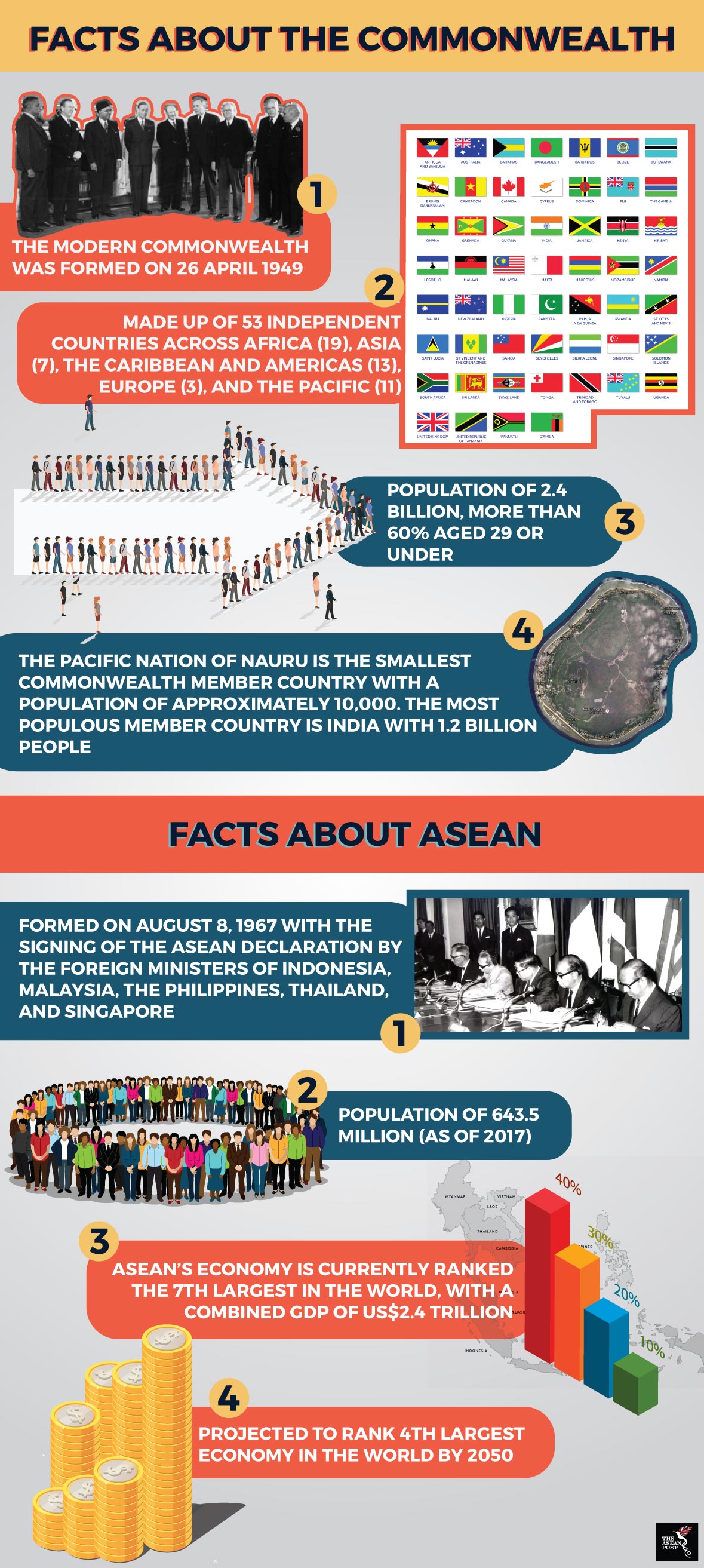The Association of Southeast Asian Nations (ASEAN) and the Commonwealth are two global blocs that share many similarities. The peoples within both entities can relate to one another through shared values of tolerance, respect, and understanding. Brunei, Malaysia, and Singapore are three ASEAN countries that are also part of the Commonwealth. It is interesting to note that the first biennial Commonwealth Heads of Government Meeting was held in Singapore in 1971. Another ASEAN country that played host to the gathering was Malaysia in 1989 (in Kuala Lumpur).
The Commonwealth’s link to ASEAN may not be as apparent as its strong relationship to other regional blocs (i.e. the African Union). However, there are many examples of the Commonwealth’s influence in the region, especially on countries that are within its socio-economic umbrella. According to Brunei’s Ministry of Foreign Affairs, the country has benefitted from the assistance and training provided by the Commonwealth in the areas of trade, industries, and human resources development. These initiatives are conducted by means of the Commonwealth Fund for Technical Cooperation (CFTC). Not only that, Brunei has benefited from other activities organised by the Commonwealth Science Council (CSC), Commonwealth of Learning (COL), Commonwealth Youth Programme (CYP), as well as the Commonwealth Foundation.
A social link between ASEAN and the Commonwealth can also be observed when Malaysia played host to the 16th Commonwealth Games in 1998. This particular event placed not only the country, but the region on a pedestal, given the significance of the Games (held once every four years since 1930).

Source: The Commonwealth & ASEAN Secretariat
On the economic side, even though Malaysia is at the heart of ASEAN and Asia, it still retains deep links to the Commonwealth. In a keynote address at the Global Business Leaders Forum earlier this decade, Malaysia’s Prime Minister, Najib Razak mentioned, “… while 25% of our trade is with ASEAN, our trade with the Commonwealth accounts for about 22% of our total global trade.” As such, the Commonwealth Business Council (CBC) expects intra-Commonwealth trade to grow to US$5 trillion and investment to reach US$250 billion in the next decade.
Over the last 10 years, intra-Commonwealth trade has risen from US$2 trillion to US$3 trillion. This accounts for 22% of global trade, while investment flows expanded from US$80 billion to US$180 billion.
Singapore’s engagement with other Commonwealth countries is a form of foreign policy that ought to be emulated. The Republic is open to sharing its sustainable development approaches and expertise with the aforementioned nations. This is conducted through technical assistance programmes. Over the years, the island nation has conducted numerous capacity building courses for Commonwealth officials in areas like disaster management, public sector management, and enhancing infrastructure for national progress. The Cities 2030-Vision, Leadership and Public Service Excellence is an example of Singapore’s contribution to the Commonwealth, in that it assists cities under the umbrella of the bloc to be more safe and resilient which will then create effective, accountable, and inclusive institutions within their respective countries.
In a recent interview, Singapore’s Prime Minister Lee Hsien Loong mentioned that “…both organisations seek to uplift the lives of their citizens through promoting good governance and sustainable practices.” The underlying theme of implementing what is right for their respective demographics is seen as a unifying factor between the two entities.
“Both (ASEAN and the Commonwealth) uphold an open, rules-based multilateral system which allows every country to prosper,” Lee added. Moreover, there is a need for ASEAN and the Commonwealth to strengthen its collective resilience against common threats like terrorism, cyber-crime, and climate change.
Prime Minister Lee attended The Commonwealth Heads of Government Meeting (CHOGM) 2018 which was held on the 16th – 20th April in London, where he brought up these concerns for both, Singapore and ASEAN.
On the whole, the Commonwealth and ASEAN are two global blocs which have different histories but are intertwined by a common goal of attaining peace and understanding, as well as mutual cooperation for its member states. Without a shadow of doubt, this relationship has to be cherished and fostered so that future generations are able to benefit from it.
